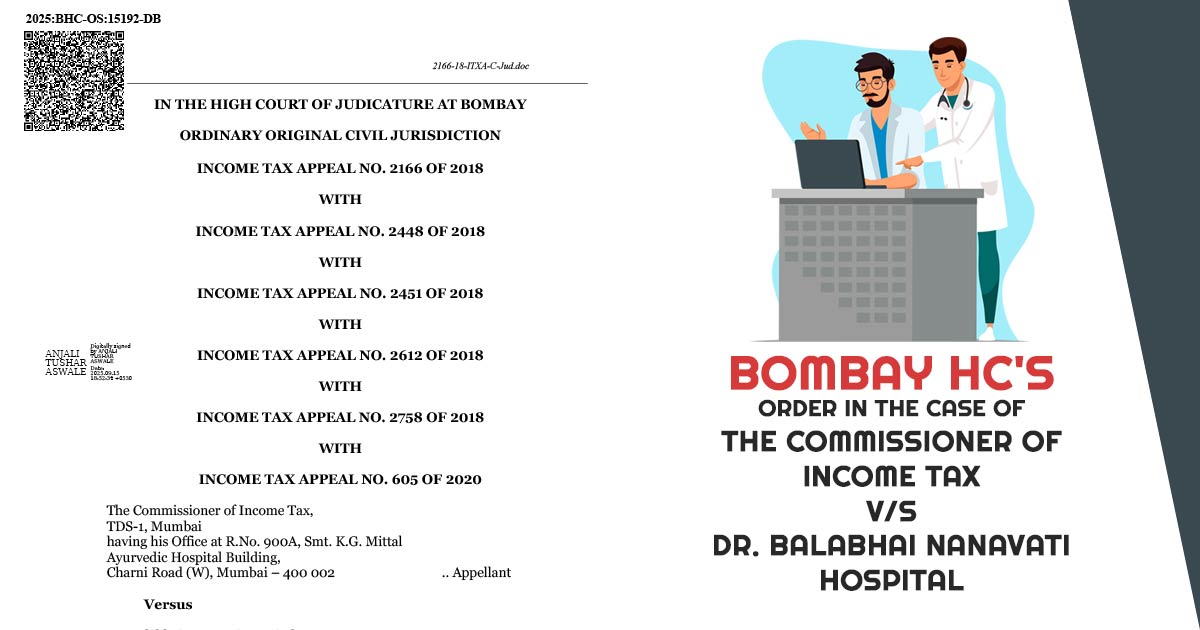
The Bombay High Court has clarified that payments made to consultant doctors do not qualify as salary if there is no fixed pay established. Consequently, these payments are subject to Tax Deduction at Source (TDS) under Section 194J of the Income Tax Act, 1961.
The Appellant, which is the Revenue, has filed a challenge against the order dated 8th September 2017, referred to as the impugned order, issued by the Income Tax Appellate Tribunal (ITAT) under the provisions of the Income Tax Act of 1961. The case involves Dr Balabhai Nanavati Hospital, identified as the Respondent-Hospital, which operates as a Trust focused on providing hospital services.
A survey was conducted on the premises of the Trust on 4th October 2010 under Section 133A. During this survey, discrepancies were identified regarding the deduction of TDS (Tax Deducted at Source), the filing of quarterly TDS returns, and delays in the TDS deduction process.
The taxpayer in its panel has appointed consultant doctors, the revenue stated. The taxpayer had deducted TDS from the honorarium pay to these doctors u/s 194J, treating it as fees for professional services, the assessing officer stated.
After analysing the appointment letters and the agreement with these consultant/honorary doctors, the assessing officer said that the Respondent-Hospital exercised a perfect deal of control over these doctors by subjecting them to different restrictive clauses given as per employment terms.
It was beyond working attendance conditions, placing accountability and governing leave, etc. In conclusion, the assessing Officer held that the consultant doctors are employees of the taxpayer and the payment paid to them was like “salary”, and thus TDS must have been deducted u/s 192 of the IT Act, instead of Section 194J. As per that, the Assessing Officer held the taxpayer in default u/s 201(1) and 201(1A) of the IT Act and raised a demand for tax and interest.
The taxpayer was not satisfied with the order of the assessing officer on both the above-mentioned counts; therefore taxpayers submitted appeals to the Commissioner of Income Tax (Appeals) [“CIT(A)”]. after hearing the respective parties and for the reasons stated in the order dated 30th March 2013, for A.Y. 2007-08 to A.Y. 2010-11 [Income Tax Appeal Nos. 2758, 2451, 2612, & 2488, all of 2018], the CIT(A) has permitted the appeals of the taxpayer. Concerning A.Y. 2011-12, the CIT(A) held in favour of the taxpayer as the issue of payment to the consultant/honorary doctors was concerned.
For payments made under the AMCs, the CIT(A) held that some AMCs were like providing “technical services”. For A.Y. 2012-13, the CIT(A) held in favour of the taxpayer insofar as the problem of payment to the consultant/honorary doctors was concerned.
The question is whether ITAT was explained in keeping with the fact that there is an employer-employee relationship between the taxpayer and the consultant/honorary doctors, and that the payments filed to them by the taxpayer shall come within the purview of Section 194J of the IT Act.
The remuneration paid to these consultant/honorary doctors is a ‘Salary’, and therefore, TDS must have been deducted u/s 192 instead of Section 194J of the IT Act.
Read Also: ITAT Delhi: TDS Deduction Compulsory for Payment to Doctor U/S 194J
Both the Authorities have analysed the facts of the case and, after that, concluded that the doctors in question cannot be termed as employees of the Assessee Hospital. For a perfect reason, they have come to this conclusion. As it was cited before, these doctors are appointed based on probation as per their qualification and expertise in the area of their specialisation.
No fixed monthly remuneration has been received by them, and they rely on the work they perform. The hospital has retained a part of the remuneration paid by the patients for these doctors. These doctors are free to practice independently in other Hospitals apart from the taxpayer hospital.
Doctors will not get any PF or ESIC facilities, and neither are any perquisites given to them. As per the patients’ needs, these doctors attend to their duties, and they are not tied to any fixed schedule for attending the Hospital. The taxpayer hospital does not practice any real supervisory control over the work entrusted to these doctors.
A division bench of Justices B.P. Colabawalla and Firdosh P. Pooniwalla cited that the relationship between the taxpayer Hospital and these doctors cannot and does not create any relationship of “employer and employee”. These doctors filed their ITR under the head “Income from Business or Profession”. These doctors themselves also do not treat the remuneration received from the taxpayer Hospital as a salary, as claimed by the Assessing Officer.
| Case Title | The Commissioner of Income Tax vs Dr Balabhai Nanavati Hospital |
| Case No. | INCOME TAX APPEAL NO. 2166 OF 2018 |
| For the Appellant | Mr Prakash Chhotaray, Ms Sangita C., Ms Akanksha Shukla |
| Revenue by | Dr K. Shivaram, Mr Rahul Hakani, and Mr Shashi Bekal |
| Bombay High Court | Read Order |









